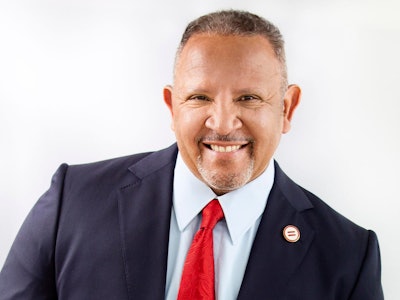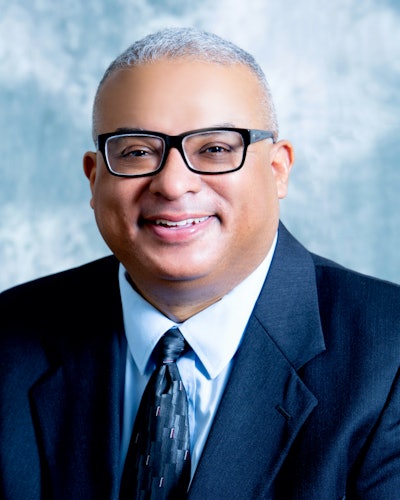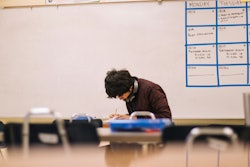The United States’ rising tide of right-wing political extremism, manifested in a surge of hateful speech and violent attacks, is a critical concern, according to this weekend’s State of Black America, the annual report on racial equality put out by the National Urban League (NUL).
Although extremism has been rising for over a decade, fueled by opposition to the Obama administration and the rise of Donald Trump, the report, created with research and data from the Southern Poverty Law Center (SPLC), the Anti-Defamation League (ADL), and the UCLA Law School, makes the case that it has accelerated since 2020, with a 44% increase in hate crimes in 2021.
“[Extremism] is the poisonous tree from which all this fruit comes,” said Marc Morial, president and CEO of the NUL and the former mayor of New Orleans. “This is driving the way people vote, it’s driving what school boards do, it’s driving what governors do. If we do not interrupt it, then our efforts to impact issues like economic policy and education policy will be academic exercises.” Marc Morial, president and CEO of the National Urban League
Marc Morial, president and CEO of the National Urban League
In the essays that make up the bulk of the report, luminaries from the government and civil rights spheres discuss how the rise of extremism can be combatted. Senator Cory Booker (D-NJ) recalls hiding in his office during the Capitol riot of January 6th, 2021, and advocates for the Domestic Terrorism Prevention Act of 2022, a bill that he introduced which would improve coordination between federal agencies in efforts to investigate domestic terrorism.
Susan Corke, director of the SPLC’s Intelligence Project, which tracks and exposes the activities of hate groups, and Michael Lieberman, senior policy council of the SPLC, argue that antisemitism functions as an entry point into hatred, becoming an engine of anti-Black racism. They offer several policy suggestions, including the funding of prevention and education initiatives against radicalism, mandating hate crime data collection as a pre-condition for receiving federal funds, and holding tech companies to civil rights laws prohibiting discrimination. They also call for the teaching of unvarnished history in schools—a call echoed in another essay about the “parents’ rights” movement, which has made swift progress in censoring “controversial” racial topics.
Several other essays examine ways to fight hatred and the aftermath of hate crimes. Governor Wes Moore of Maryland writes that extremism is driven by a false sense of patriotism and discusses initiatives that promote true patriotism through service.
John C. Yang, the president of Asian Americans Advancing Justice calls for unity between the Asian and Black communities when it comes to dismantling white supremacy. And Angela Tuck, senior editor of the SPLC’s Intelligence Project offers a moving portrait of the slow recovery of the Mother Emanuel African Methodist Episcopal Church, the site of a mass shooting by a white supremacist in 2015.
The report also includes a special section about environmental justice. Several essays paint a dispiriting picture: minoritized people suffer disproportionately from the environmental wrongs of whites, in terms both of pollution and the devastation of their land and resources. Morial believes that the section is especially important because the shift to renewable energy offers big economic opportunities.
“Black people must be involved in that,” Yang said. “The technology revolution did not include black people, and therefore, we had a digital divide. As this movement begins, we’re saying that we have to be intimately involved in it. We don’t want to be the last neighborhoods to get renewable energy, to get EV charging stations, to get jobs in renewable energy.”
There’s reason for concern, however—as an essay by Morial and Gregory Wetstone, president and CEO of the American Council on Renewable Energy points out, a recent study found that only 12 of 658 renewable energy businesses are minority- or woman-owned. And although new laws create incentives to hire minoritized workers, a diverse workforce will have to be recruited and trained. This will require partnerships with higher education, and, they argue, more funding for registered apprenticeships.
 Dr. Robert Collins, professor of urban studies and public policy at Dillard University
Dr. Robert Collins, professor of urban studies and public policy at Dillard University
“It’s more a call to action,” he said. “They’re letting people know, if we don’t do something about this, more bad things are going to happen.”
According to Collins, the NUL speaks to a Black, educated, middle class audience that is less likely to be reached by a more confrontational group like Black Lives Matter or a predominantly white civil rights organization like the ACLU.
“[The NUL] probably didn’t see sufficient activism from their demographic,” he said. “So, their position is, we’re going to hit them over the head with this report and let them know, y’all better wake up and get involved.”
Collins is unsure whether the report will make a notable difference in the short-term
“I don’t mean to sound cynical, but I don’t think we’re going to see any immediate impact because people are so locked into their political positions right now,” he said.
But, Collins argues, advocates of social justice have to keep working whether they’re making visible progress or not.
“Sometimes you have to beat up against a door, even if you don’t see the door moving,” he said. “History teaches us, if you beat on the door long enough, eventually the door gives way.”
Jon Edelman can be reached at [email protected]


















